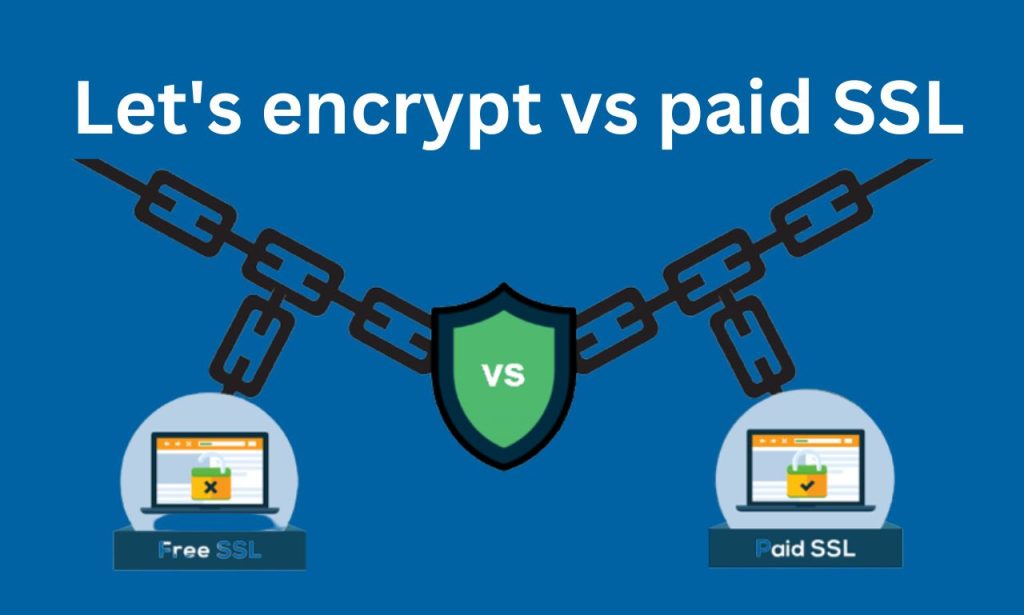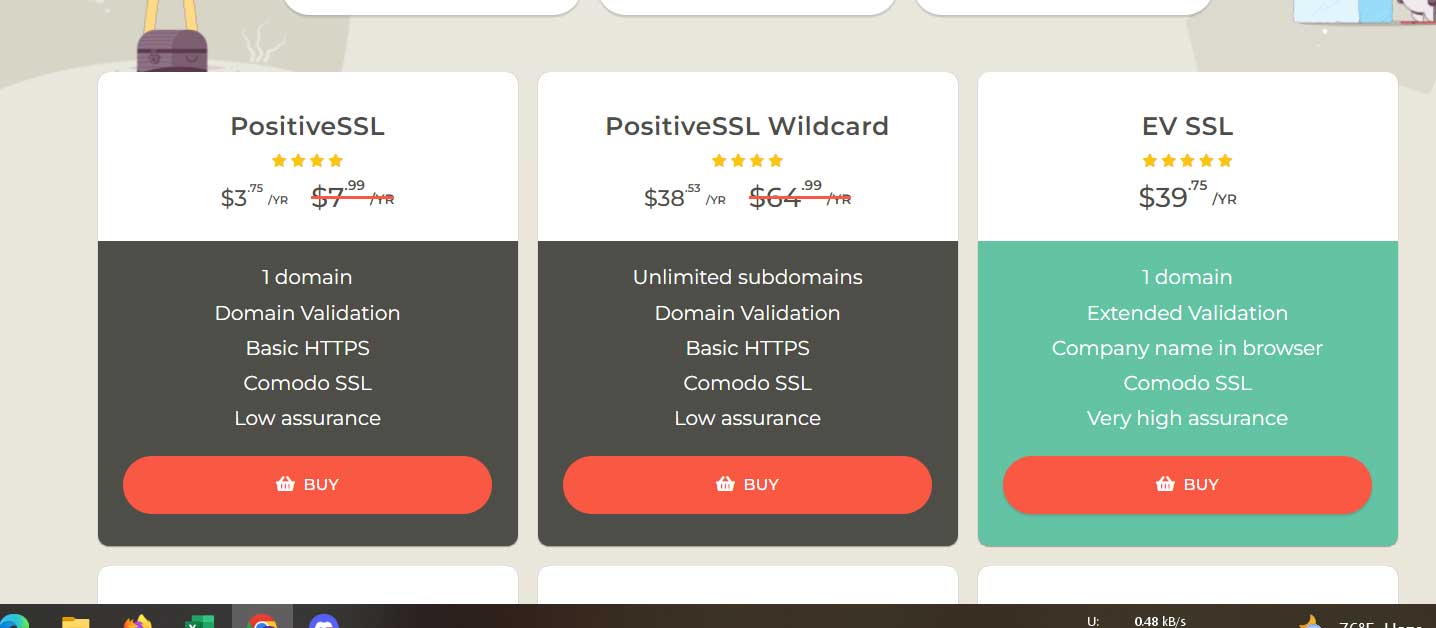Today We will discuss the distinctions between a free let’s encrypt vs paid ssl certificate. However, it is crucial to comprehend why HTTPS matters and the advantages of implementing it on your website.
To begin, let’s examine the significance of HTTPS. HTTPS encrypts the data transmitted between a website and its visitors, preventing unauthorized parties from accessing or manipulating sensitive information. This is particularly essential for websites that handle confidential data such as login credentials, payment details, or personal information. Furthermore, Google and other search engines prioritize HTTPS websites in search results, boosting your website’s visibility and credibility.
Now, let’s turn our attention to the differences between a free let’s encrypt vs paid ssl certificate. Let’s Encrypt SSLs are issued at no cost and can be obtained by anyone with a domain name. They are suitable for small businesses or personal websites with limited budgets. In contrast, paid SSL certificates are provided by commercial Certificate Authorities and offer additional features such as extended validation, warranty, and support. They are typically more expensive than Let’s Encrypt SSLs and may be necessary for larger businesses with complex security needs.
What Are the Benefits of HTTPS?
HTTPS (Hyper Text Transfer Protocol Secure) is the secure version of HTTP, which is the protocol used to transmit data between a web server and a web browser. Here are some benefits of implementing HTTPS on your website:
- Data Encryption: HTTPS encrypts the data transmitted between a website and its visitors, preventing unauthorized parties from accessing or manipulating sensitive information. This is particularly crucial for websites that handle confidential data such as login credentials, payment details, or personal information.
- Authentication: HTTPS verifies the identity of a website, ensuring that visitors are communicating with the intended website and not an imposter. This is accomplished through SSL (Secure Sockets Layer) certificates that are issued by trusted Certificate Authorities.
- Improved Search Engine Ranking: Google and other search engines prioritize HTTPS websites in search results, boosting your website’s visibility and credibility.
- Increased Trust: Implementing HTTPS on your website can help build trust with your visitors, as they are more likely to feel confident in providing sensitive information if they know that the website is secure.
- Compliance: HTTPS is required for compliance with regulations such as the Payment Card Industry Data Security Standard (PCI DSS), which applies to websites that handle payment information.
So What Is Let’s Encrypt?
Let’s Encrypt is a nonprofit certificate authority that provides free SSL/TLS (Secure Sockets Layer/Transport Layer Security) certificates to websites. SSL/TLS certificates enable HTTPS, which encrypts the data transmitted between a website and its visitors, preventing unauthorized parties from accessing or manipulating sensitive information.
Let’s Encrypt was founded in 2014 with the goal of making HTTPS more accessible to website owners. Traditionally, obtaining and installing an SSL/TLS certificate required technical expertise and was often expensive. Let’s Encrypt simplified the process by offering free, automated SSL/TLS certificates that can be obtained and installed with just a few clicks.
Let’s Encrypt certificates are trusted by all major browsers and operating systems, and they have issued over a billion certificates to date. Their mission is to create a more secure and privacy-respecting web by making HTTPS the default for all websites.
What Is the Difference Between a Free let’s encrypt vs paid ssl Certificate?
Although Let’s Encrypt SSL certificates are available for free and provide basic encryption, there are still several reasons why one might choose to pay for a SSL certificate from a commercial provider.
Firstly, paid SSL certificates offer additional validation, warranty, and support features that may not be available with a Let’s Encrypt SSL. For example, extended validation certificates require extensive documentation to verify the website owner’s identity, and may offer financial protection in case of data breaches caused by SSL/TLS issues.
Secondly, some website owners may prefer to have a SSL certificate that is issued by a well-known commercial Certificate Authority, as this can provide an extra level of trust and credibility to their website.
Finally, commercial SSL providers may offer additional features such as vulnerability assessments and scanning, which can help identify and address potential security issues on the website.
1. Validation Levels
There are three main types of SSL certificates available from commercial Certificate Authorities (CAs): Domain Validation (DV), Organization Validation (OV), and Extended Validation (EV).
Domain Validation SSL certificates offer a cost-effective and fast way to implement SSL on your website. These certificates only verify that you own the domain, without performing any additional organizational validation.
Organization Validation SSL certificates provide instant identity confirmation and strong SSL protection for both your website and business.
The highest class of SSL available today is the Extended Validation SSL certificate (EV). This type of SSL provides the most credibility and trust to your website, compared to using an organization or domain validated SSL certificate.
However, Let’s Encrypt can only provide DV certificates due to the way its automated systems are set up. While a DV certificate may be sufficient for many websites, those seeking a higher level of verification and the increased trust that comes with it will need to look for a premium type of SSL certificate.
2. Warranty
In addition to their advanced validation features, premium SSL certificates often come with a warranty, providing a form of insurance in case of certificate failure, fraudulent transactions, or financial loss for end-users. These warranties typically range from USD $10,000 to USD $1,500,000, depending on the type of SSL certificate.
In contrast, Let’s Encrypt certificates do not offer any form of warranty coverage.
3. Trust Site Seal
Premium SSL certificates often come with a trust seal that can be displayed on your website, which has been shown to increase visitor confidence and customer conversions. This seal indicates that the website has been validated and secured by a trusted third-party Certificate Authority.
In contrast, Let’s Encrypt certificates do not provide any type of site seal.
4:Price
Let’s Encrypt’s ability to provide free SSL certificates through automation is difficult for other providers to compete with. However, it’s important to note that the absence of a price tag often means certain features and support may not be included.
If you’re interested in obtaining an SSL certificate, it’s a good idea to check with your hosting provider for available options. Alternatively, you are free to purchase an SSL from any provider, but keep in mind that manual installation and setup may be required.
Which Type of SSL Certificate Should You Choose for Your Site?
When deciding whether to go for a free let’s encrypt vs paid SSL certificate, it’s important to consider the specific needs of your website and your budget. If your website includes eCommerce or stores sensitive user data, it’s worth investing in a paid SSL certificate with higher levels of validation. This extra layer of security can help to boost customer trust, improve your search engine rankings, and protect sensitive data.
However, for simple websites or blogs that don’t involve eCommerce or sensitive data, a free Let’s Encrypt SSL may be a good option. It can provide the basic security required to display the lock symbol in the browser and can be easily upgraded to a more advanced SSL certificate as your site grows.
It’s important to keep in mind that while some internet users may check SSL certificates before making a purchase, most people are not likely to do so. The average person may not even understand what an SSL certificate is or how to check its validity. Nonetheless, displaying a secure connection can provide a sense of trust and security to website visitors, particularly those who are more internet-savvy.
Conclusion
Let’s Encrypt is a great starting point for websites to move towards HTTPS, especially for smaller personal sites and blogs. However, for enterprise-level sites that handle sensitive data, a premium SSL Certificate provides unbeatable benefits. If you’re running an e-commerce platform or any business that accepts online payments, ensuring the safety of your customer’s data is crucial. Although Let’s Encrypt offers SSL protection, it lacks the comprehensive coverage and reliability provided by a premium SSL Certificate.
At sslseller, we offer a variety of premium SSL Certificates from trusted brands in online security. Our pricing is highly competitive, and if you already have a certificate with another web host, we’ll add any remaining validity up to an additional 12 months. By choosing a premium SSL Certificate, you can ensure maximum security and protection for your customers’ data, which is essential for any business that deals with sensitive information.








